基于机器学习的Bitcoin价格预测(Python)
Import Libraries and Data
import numpy as np
import matplotlib.pyplot as plt
import pandas as pd
import seaborn as sns
import warnings
warnings.filterwarnings('ignore')
data=pd.read_csv('bitcoin_price_bitcoin_price.2013Apr-2017Aug.csv',index_col='Date')
data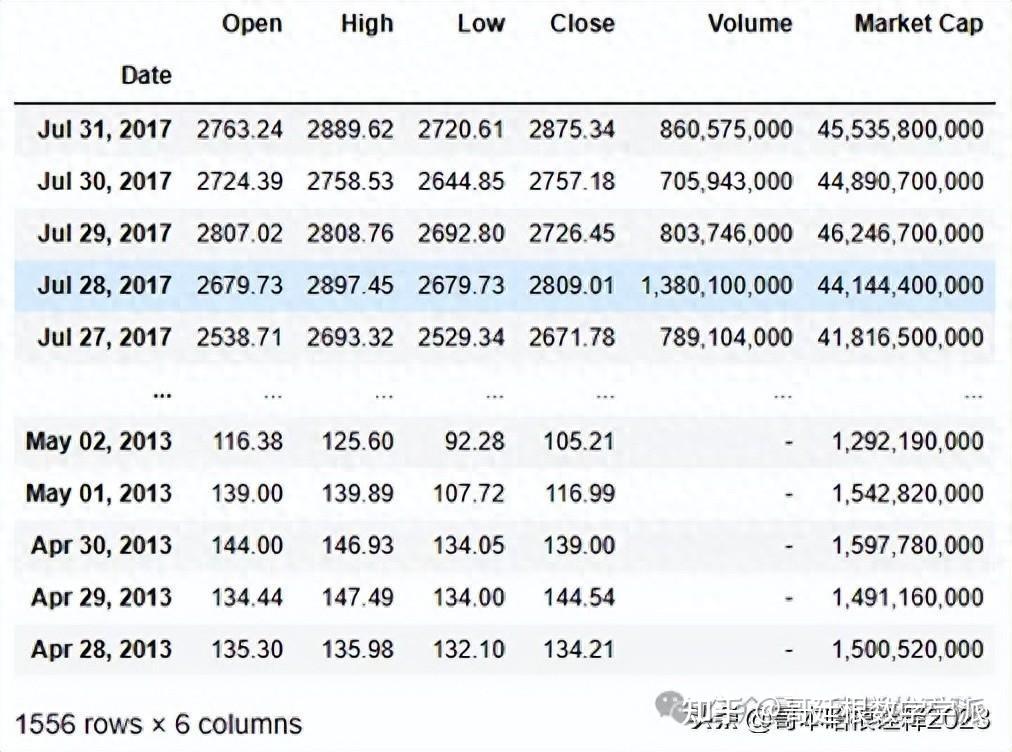
Data Analysis
accuracy_arr=[]#array to store accuracy
data.info()
<class 'pandas.core.frame.DataFrame'>
Index: 1556 entries, Jul 31, 2017 to Apr 28, 2013
Data columns (total 6 columns):
# Column Non-Null Count Dtype
--- ------ -------------- -----
0 Open 1556 non-null float64
1 High 1556 non-null float64
2 Low 1556 non-null float64
3 Close 1556 non-null float64
4 Volume 1556 non-null object
5 Market Cap 1556 non-null object
dtypes: float64(4), object(2)
memory usage: 85.1+ KB
data.describe()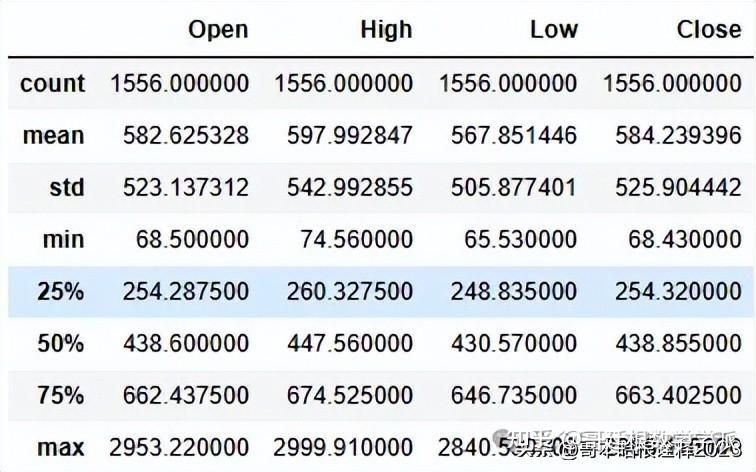
Preprocessing
data=data.drop(['Volume','Market Cap'],axis=1)
data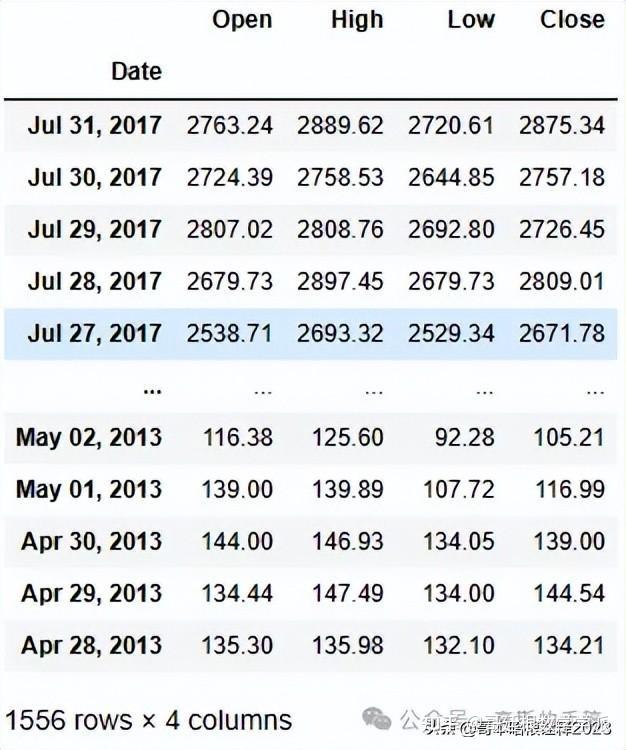
data.index=pd.to_datetime(data.index)
data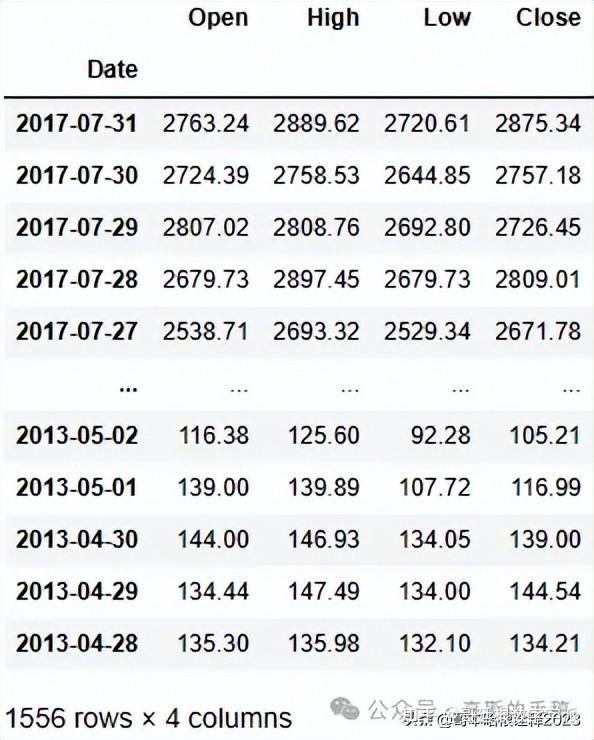
data = data.sort_index()
data.head()| Open | High | Low | Close | |
| Date | ||||
| 2013-04-28 | 135.30 | 135.98 | 132.10 | 134.21 |
| 2013-04-29 | 134.44 | 147.49 | 134.00 | 144.54 |
| 2013-04-30 | 144.00 | 146.93 | 134.05 | 139.00 |
| 2013-05-01 | 139.00 | 139.89 | 107.72 | 116.99 |
| 2013-05-02 | 116.38 | 125.60 | 92.28 | 105.21 |
Plot of Bitcoin price vs Date
plt.figure(figsize=(12,6))
data['Close'].plot()
plt.ylabel("Daily Bitcoin price")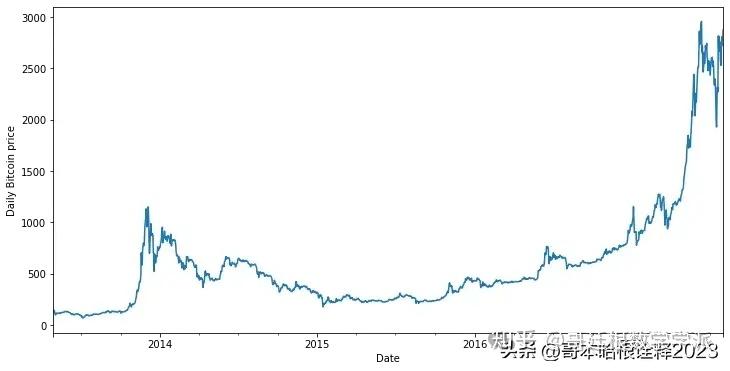
data=data.drop(['Open','High','Low',],axis=1) ##drop the open, high and low
data| Close | |
| Date | |
| 2013-04-28 | 134.21 |
| 2013-04-29 | 144.54 |
| 2013-04-30 | 139.00 |
| 2013-05-01 | 116.99 |
| 2013-05-02 | 105.21 |
| ... | ... |
| 2017-07-27 | 2671.78 |
| 2017-07-28 | 2809.01 |
| 2017-07-29 | 2726.45 |
| 2017-07-30 | 2757.18 |
| 2017-07-31 | 2875.34 |
1556 rows × 1 columns
Generating Features
columns_name=['f1','f2','f3','f4','f5']
new=data
for i in range(1,6):
data[columns_name[i-1]]=data['Close'].shift(periods=-i)
data.tail(10)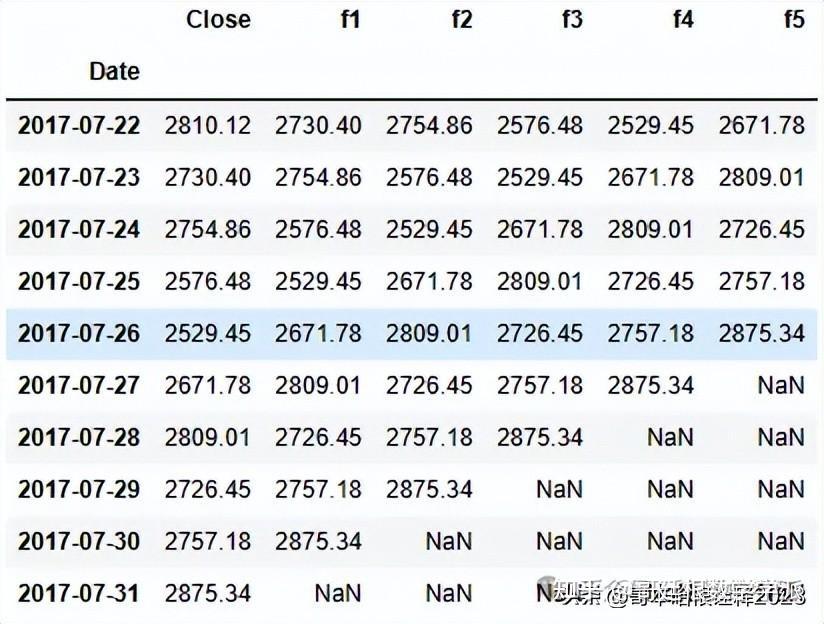
data=data.iloc[0:len(data)-5,:]Scaling
from sklearn.preprocessing import MinMaxScaler
scaler = MinMaxScaler()
scaler.fit(data)
data=scaler.transform(data)
data=pd.DataFrame(data,columns=[['Close','f1','f2','f3','f4','f5']])
x=data.iloc[:,[1,2,3,4,5]]
y=data.iloc[:,[0]]
x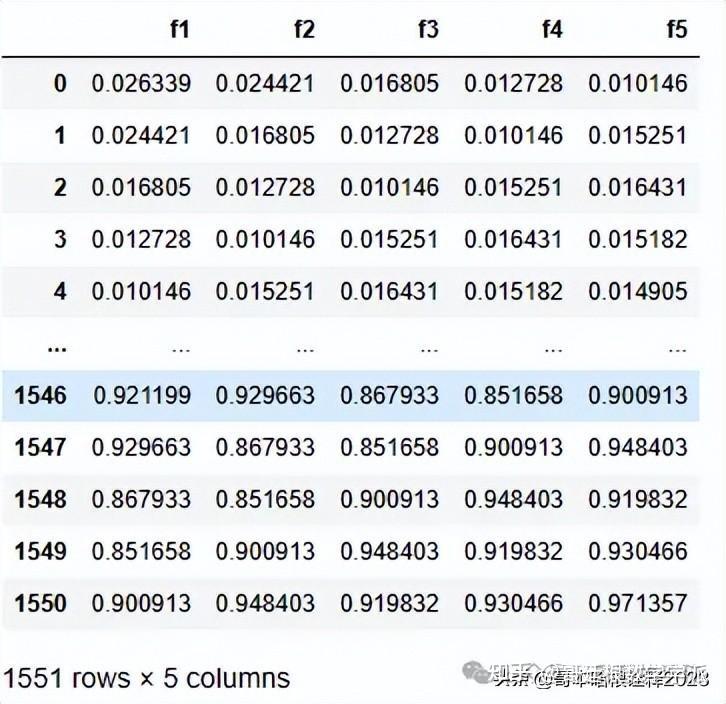
Train Test Split
train_size = int(len(data) * 0.7)
test_size = len(data) - train_size
train, test = data.iloc[0:train_size,:], data.iloc[train_size:len(data),:]
x_train=train.iloc[:,[1,2,3,4,5]]
y_train=train.iloc[:,[0]]
x_test=test.iloc[:,[1,2,3,4,5]]
y_test=test.iloc[:,[0]]Decision Tree Classifier
Decision Tree Classifier with different hyperparameters
from sklearn.tree import DecisionTreeRegressor
from sklearn import metrics
Criterion=['squared_error']
for info in Criterion:
for i in range (5,15):
for j in range (2,10):
for k in range (2,20):
cls=DecisionTreeRegressor(criterion=info, max_depth=i,max_leaf_nodes=2*k,min_samples_split=j,random_state=42)
cls.fit(x_train,y_train)
y_pred=cls.predict(x_test)
x_pred=cls.predict(x_train)
# if metrics.r2_score(y_test,y_pred)>0.3:
print(info,i,j,k,metrics.r2_score(y_test,y_pred))
squared_error 14 9 9 0.27741862551731833
squared_error 14 9 10 0.27749566394131886
squared_error 14 9 11 0.277387184544298
squared_error 14 9 12 0.2776277578525831
squared_error 14 9 13 0.27762221885488847
squared_error 14 9 14 0.27644323078170563
squared_error 14 9 15 0.2764806120616359
squared_error 14 9 16 0.27654989524362195
squared_error 14 9 17 0.27654989524362195
squared_error 14 9 18 0.27654989524362195
squared_error 14 9 19 0.27663449679360885
from sklearn.tree import DecisionTreeRegressor
dtree = DecisionTreeRegressor(criterion='squared_error', max_depth=8,max_leaf_nodes=16,min_samples_split=2,random_state=42)
dtree.fit(x_train,y_train)
y_pred=dtree.predict(x_test)
metrics.r2_score(y_test,y_pred)
0.279281936679907
accuracy_arr.append(metrics.r2_score(y_test,y_pred))
y_pred=pd.DataFrame(y_pred)
# plt.figure(figsize=(12,6))
y_test=np.array(y_test)
y_pred=np.array(y_pred)Plot to compare price vs Days
plt.figure(figsize=(12,6))
plt.plot(np.array(range(466)),y_test,label='Original')
plt.plot(np.array(range(466)),y_pred,label='Predicted')
plt.legend()
plt.xlabel('Days')
plt.ylabel('Price(Scaled)')
plt.show()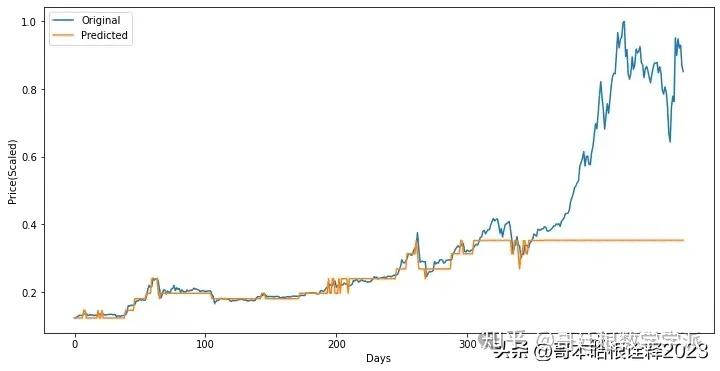
XGB (Shallow)
Implement model with differnet learning rate
import xgboost as xgb
for i in range(1,40):
XGB = xgb.XGBRegressor(max_depth=2,learning_rate=0.01*i)
XGB.fit(x_train,y_train)
y_pred=XGB.predict(x_test)
k=XGB.predict(x_train)
print(metrics.r2_score(y_test,y_pred),i)
XGB = xgb.XGBRegressor(max_depth=2,learning_rate=0.01*35)
XGB.fit(x_train,y_train)
y_pred=XGB.predict(x_test)
k=XGB.predict(x_train)
print(metrics.r2_score(y_test,y_pred))
accuracy_arr.append(metrics.r2_score(y_test,y_pred))Plot of Price vs Days
plt.figure(figsize=(12,6))
plt.plot(np.array(range(466)),y_test,label='Original')
plt.plot(np.array(range(466)),y_pred,label='Predicted')
plt.xlabel('Days')
plt.ylabel('Price(Scaled)')
plt.legend()
plt.show()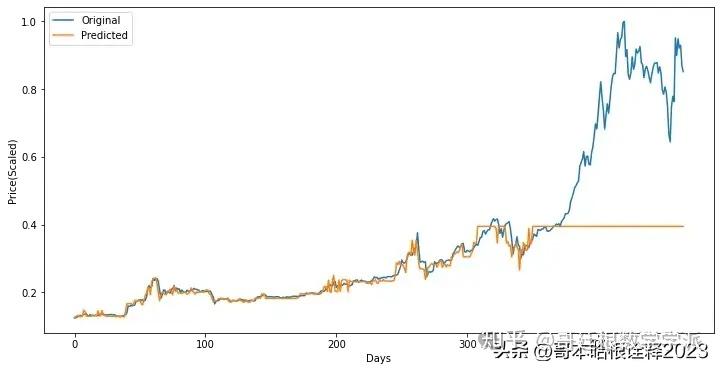
XGB (Deep)
import xgboost as xgb
for i in range(1,40):
XGB = xgb.XGBRegressor(max_depth=12,learning_rate=0.01*i)
XGB.fit(x_train,y_train)
y_pred=XGB.predict(x_test)
k=XGB.predict(x_train)
print(metrics.r2_score(y_test,y_pred),i)
[15:46:51] WARNING: /workspace/src/objective/regression_obj.cu:152: reg:linear is now deprecated in favor of reg:squarederror.
0.33455680167499247 35
[15:46:51] WARNING: /workspace/src/objective/regression_obj.cu:152: reg:linear is now deprecated in favor of reg:squarederror.
0.33621573823007167 36
[15:46:52] WARNING: /workspace/src/objective/regression_obj.cu:152: reg:linear is now deprecated in favor of reg:squarederror.
0.307782864222201 37
[15:46:52] WARNING: /workspace/src/objective/regression_obj.cu:152: reg:linear is now deprecated in favor of reg:squarederror.
0.30853605662649164 38
[15:46:52] WARNING: /workspace/src/objective/regression_obj.cu:152: reg:linear is now deprecated in favor of reg:squarederror.
0.3007506935530976 39
XGB = xgb.XGBRegressor(max_depth=12,learning_rate=0.01*26)
XGB.fit(x_train,y_train)
y_pred=XGB.predict(x_test)
k=XGB.predict(x_train)
print(metrics.r2_score(y_test,y_pred))Plot of Price vs Days
plt.figure(figsize=(12,6))
plt.plot(np.array(range(466)),y_test,label='Original')
plt.plot(np.array(range(466)),y_pred,label='Predicted')
plt.xlabel('Days')
plt.ylabel('Price(Scaled)')
plt.legend()
plt.show()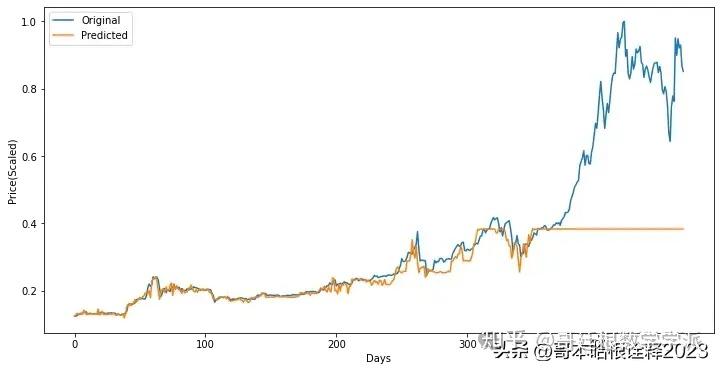
Linear Regression
Implement Model
from sklearn.linear_model import LinearRegression
reg=LinearRegression()
reg.fit(x_train,y_train)
y_pred=reg.predict(x_test)
print(metrics.r2_score(y_test,y_pred))
0.9926650271996021
accuracy_arr.append(metrics.r2_score(y_test,y_pred))Plot of Price vs Days
plt.figure(figsize=(12,6))
plt.plot(np.array(range(466)),y_test,label='Original')
plt.plot(np.array(range(466)),y_pred,label='Predicted')
plt.xlabel('Days')
plt.ylabel('Price(Scaled)')
plt.legend()
plt.show()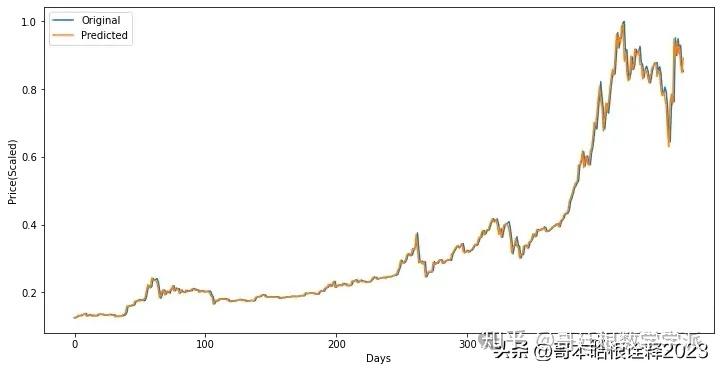
Random Forest
Implement Random Forest with hyperparameters
from sklearn.ensemble import RandomForestRegressor
clf = RandomForestRegressor(max_depth=6, random_state=0,n_estimators=500)
clf.fit(x_train,y_train)
y_pred=clf.predict(x_test)
metrics.r2_score(y_test,y_pred)
0.22059311748223798
accuracy_arr.append(metrics.r2_score(y_test,y_pred))Plot of Price vs Days
plt.figure(figsize=(12,6))
plt.plot(np.array(range(466)),y_test,label='Original')
plt.plot(np.array(range(466)),y_pred,label='Predicted')
plt.xlabel('Days')
plt.ylabel('Price(Scaled)')
plt.legend()
plt.show()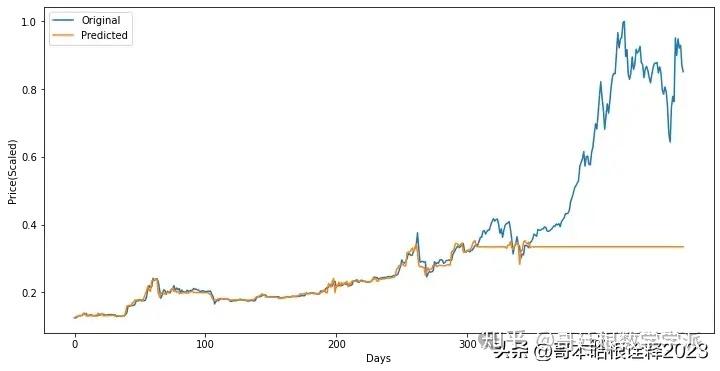
LSTM
Import Libraries
from keras.models import Sequential
from keras.layers import Dense
from keras.layers import LSTM
x_train=np.array(x_train)
x_test=np.array(x_test)Change shape of numpy array
trainX = np.reshape(x_train, (x_train.shape[0], 1, x_train.shape[1]))
testX = np.reshape(x_test, (x_test.shape[0], 1, x_test.shape[1]))
testY=np.array(y_test)
trainY=np.array(y_train)Implement LSTM model
lstm = Sequential()
lstm.add(LSTM(100, input_shape=(trainX.shape[1], trainX.shape[2])))
lstm.add(Dense(1))
lstm.compile(loss='mae', optimizer='adam')
lstm.fit(trainX, trainY, epochs=300, batch_size=100, verbose=0, shuffle=False)Plot of Price vs Days for comparision
y_pred = lstm.predict(testX)
plt.figure(figsize=(12,6))
plt.plot(y_pred, label='predicted')
plt.plot(testY, label='original')
plt.xlabel('Days')
plt.ylabel('Price(Scaled)')
plt.legend()
plt.show()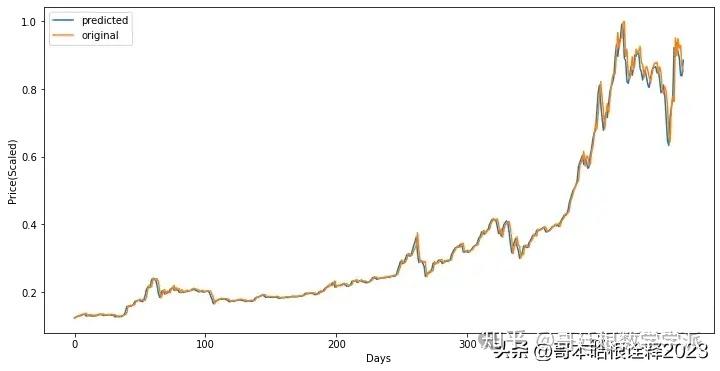
R2 score Plot
models=['DTR','XGB(Shallow)','XGB(Deep)','Linear Regressor','Random Forest','LSTM']
fig = plt.figure(figsize = (10, 5))
plt.bar(models,accuracy_arr ,width = 0.4)
plt.xlabel("Models")
plt.ylabel("R2 Score")
plt.show()学术咨询:
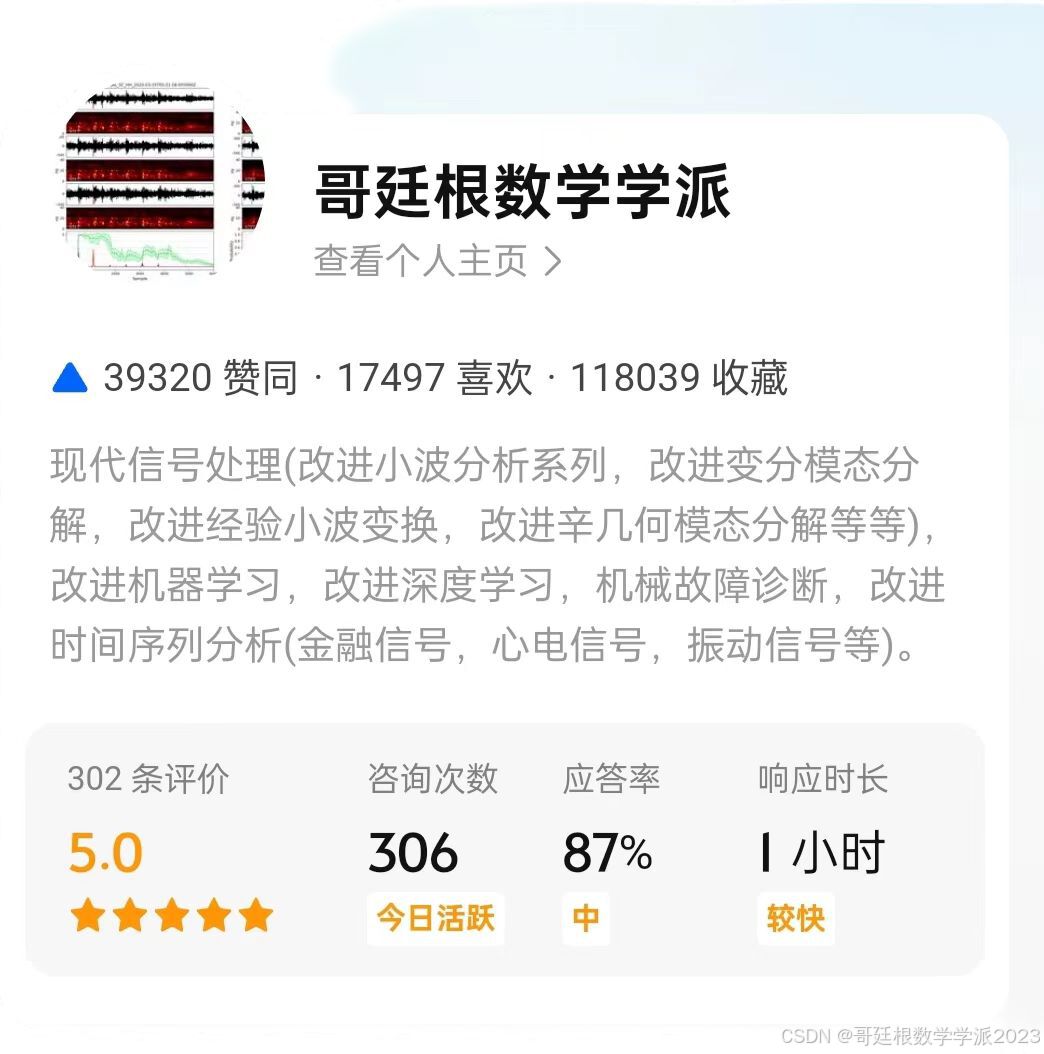

担任《Mechanical System and Signal Processing》《中国电机工程学报》等期刊审稿专家,擅长领域:信号滤波/降噪,机器学习/深度学习,时间序列预分析/预测,设备故障诊断/缺陷检测/异常检测。
分割线分割线分割线分割线分割线分割线
一种基于优化盲反褶积的旋转机械振动信号滤波降噪方法(MATLAB)
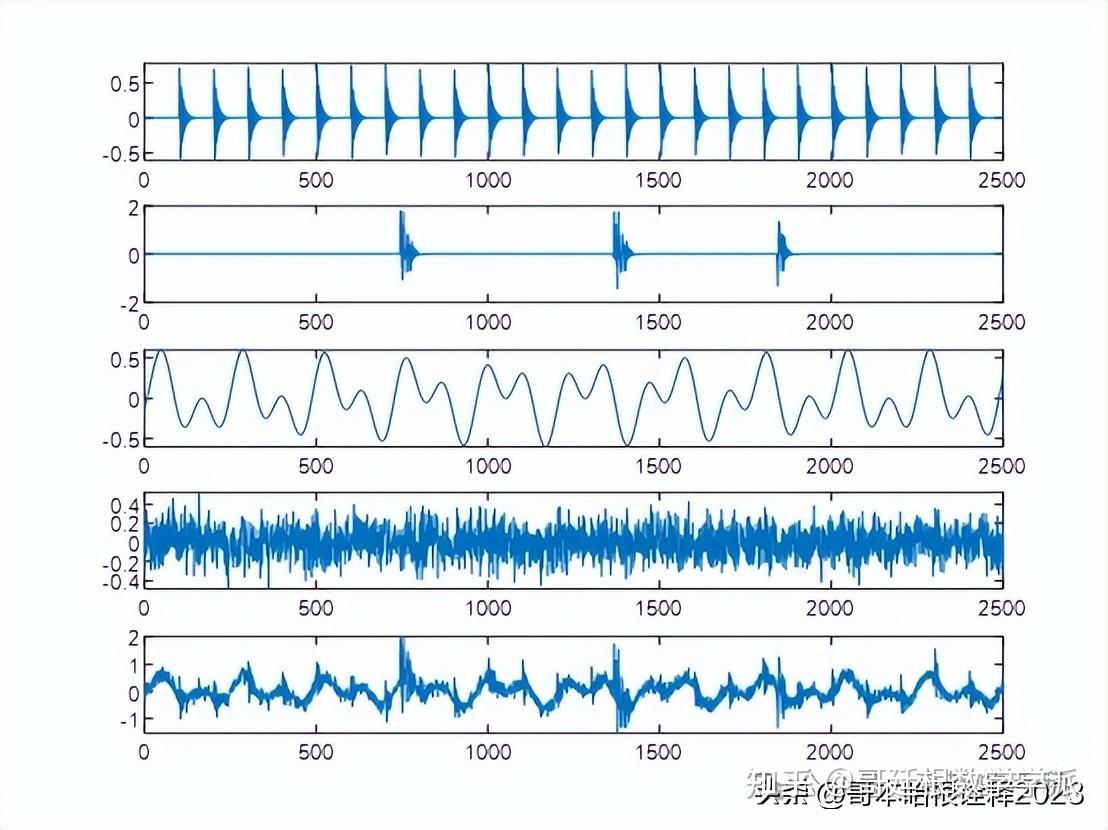
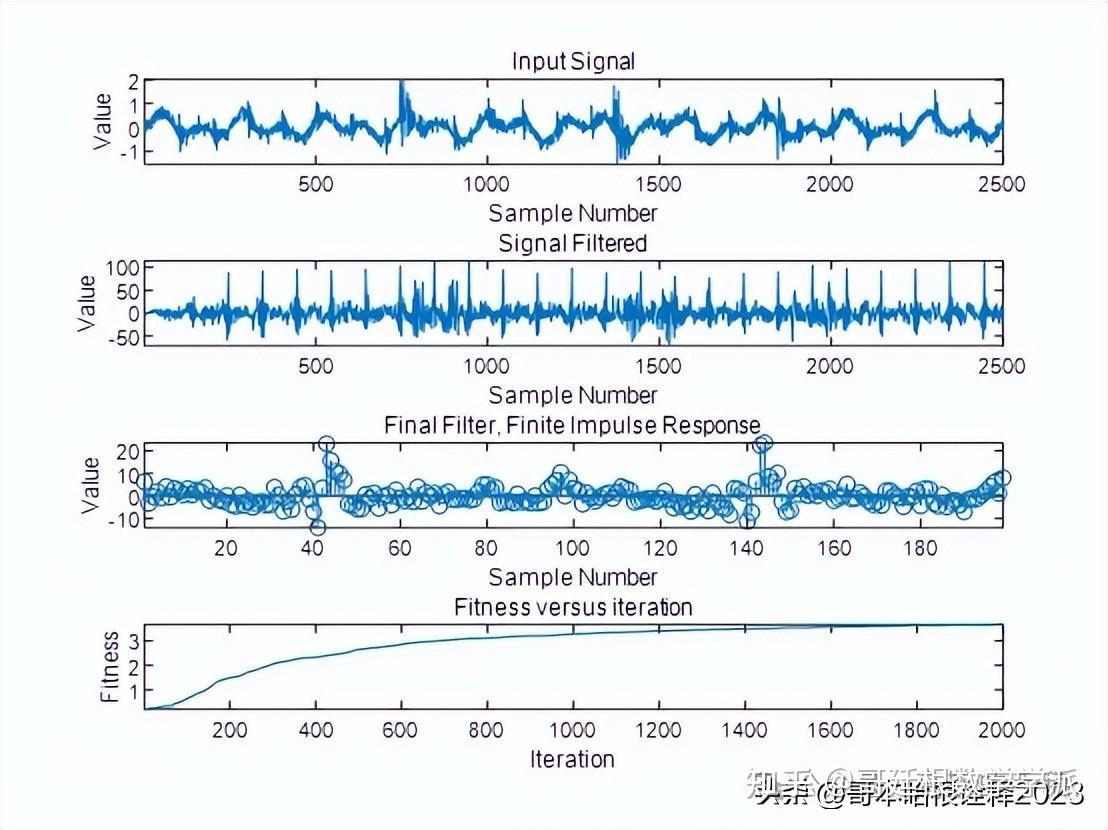
一种基于傅里叶贝塞尔级数展开的经验小波变换方法(Python)
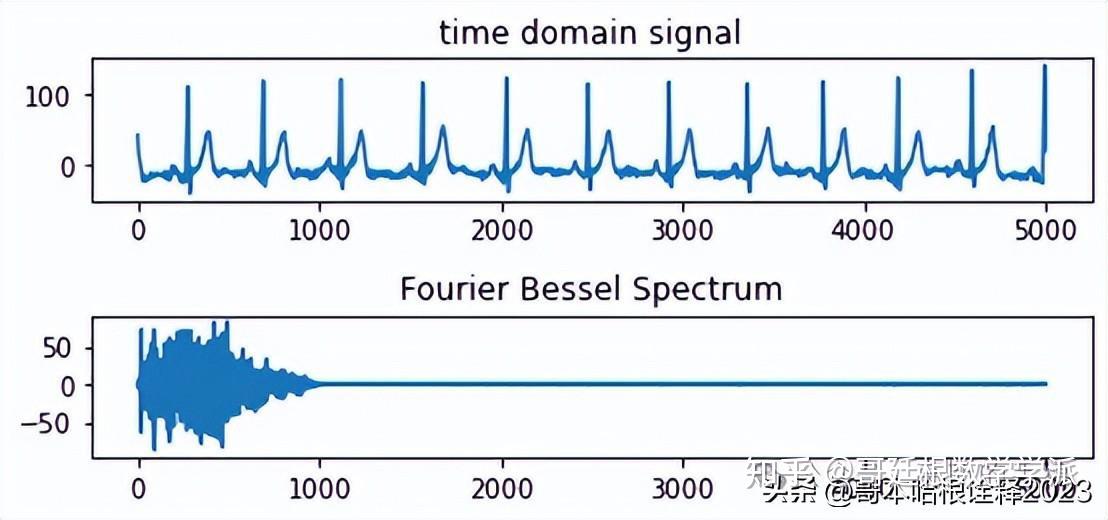

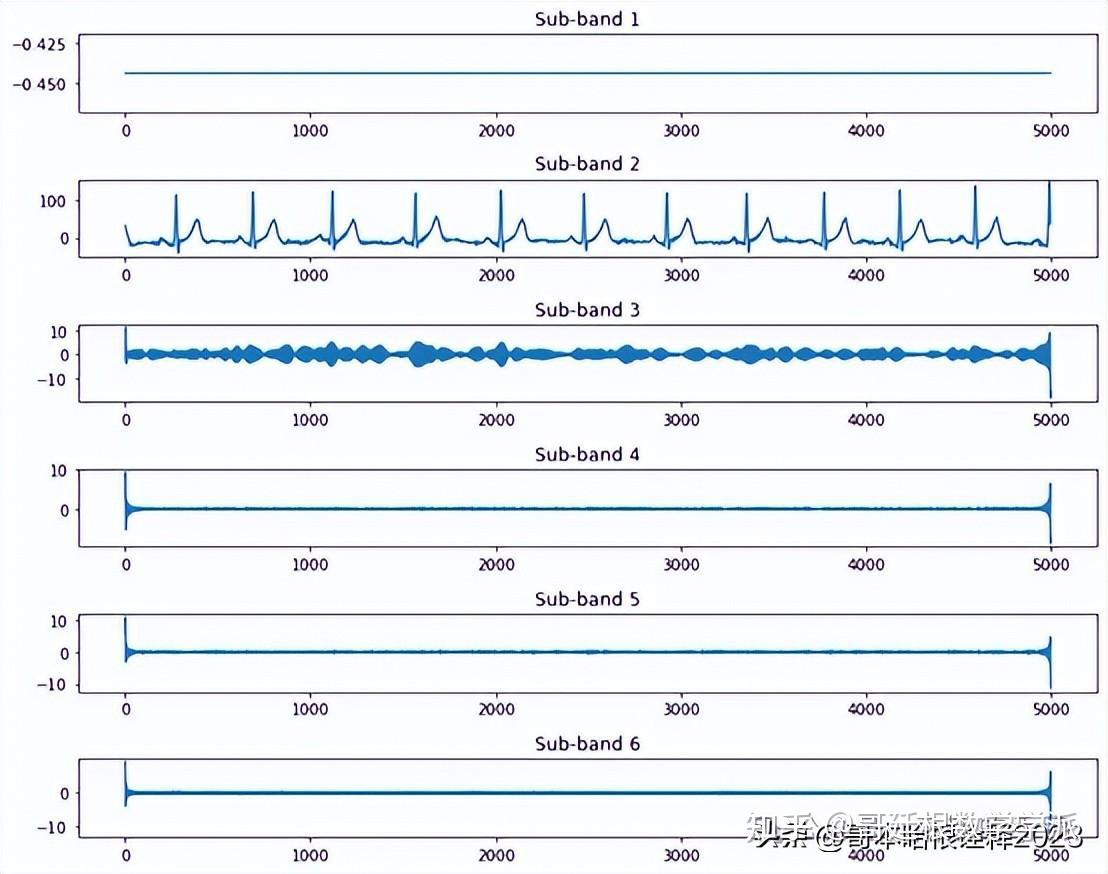
完整代码可通过学术咨询获得:
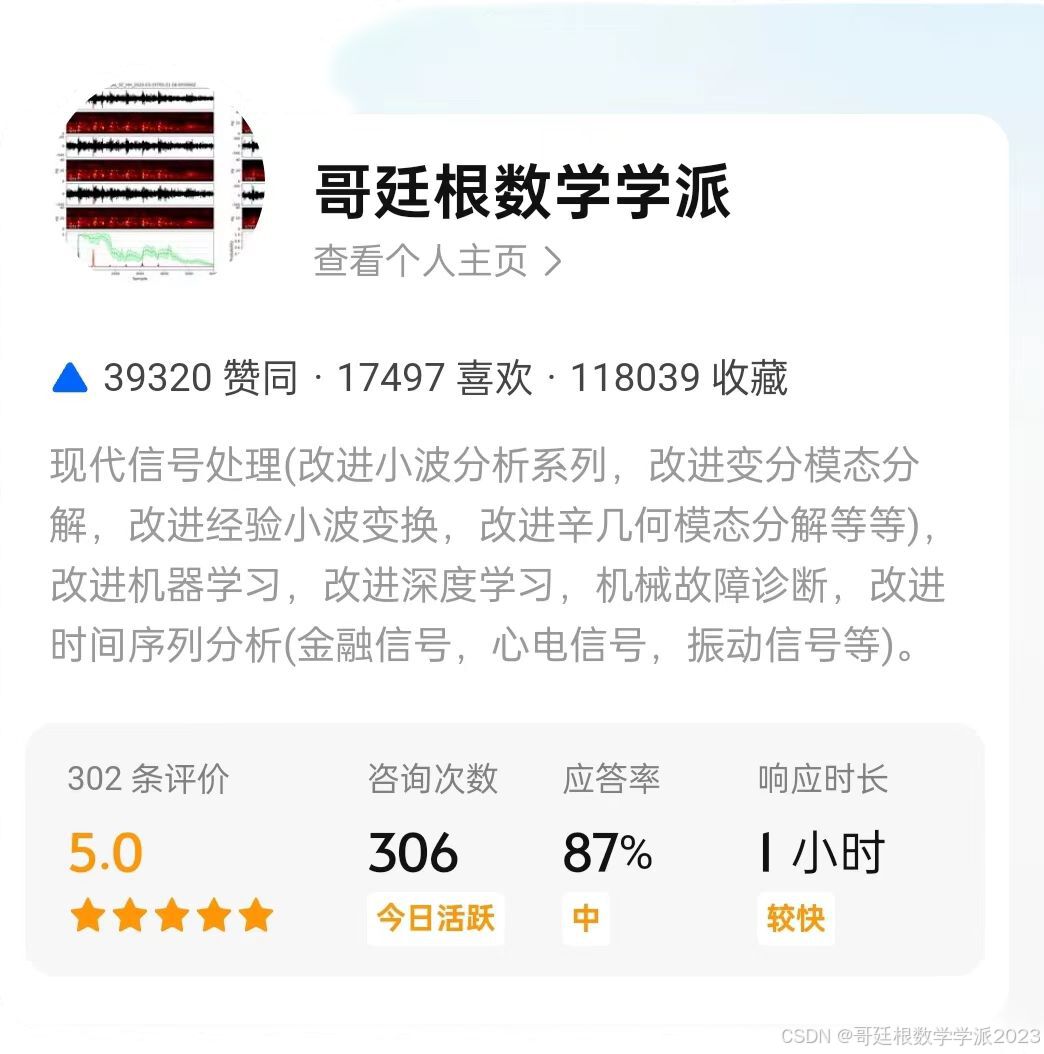





























 被折叠的 条评论
为什么被折叠?
被折叠的 条评论
为什么被折叠?








